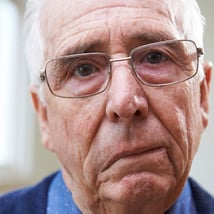 After a stroke, the main focus for the patient, their family, friends, physicians, therapists and other health care professionals is often on their physical aspects. How far can the patient walk? Can the patient still get dressed with the use of just one hand? Can the patient safely swallow food and liquid without coughing or choking? Will the patient need to use oxygen after discharge to home? These are all issues that are visible and obvious.
After a stroke, the main focus for the patient, their family, friends, physicians, therapists and other health care professionals is often on their physical aspects. How far can the patient walk? Can the patient still get dressed with the use of just one hand? Can the patient safely swallow food and liquid without coughing or choking? Will the patient need to use oxygen after discharge to home? These are all issues that are visible and obvious.
Other issues that cannot be seen, and may not be so obvious, include things like pain levels. Our health care system has made great strides in evaluating these types of problems. For example, we now routinely ask patients if they are having pain and to what degree. Pain is a barrier to being able to participate in therapy which can have a negative impact on progress in rehabilitation.
However, an important unseen issue that may go untreated is depression. For many people, a stroke may completely alter life as they knew it. Lots of sudden changes are happening to them and around them that they have no control over. Feelings of being overwhelmed and eventual isolation can easily lead to depression. This can negatively impact their recovery.
Signs of depression may include the following:
- Persistent sad, anxious or “empty” mood
- Restlessness and irritability
- Feelings of hopelessness, pessimism, guilt, worthlessness or helplessness
- Loss of interest or pleasure in hobbies and activities, including sex
- Decreased energy and fatigue, and feeling “slowed down”
- Difficulty concentrating, remembering and making decisions
- Insomnia or oversleeping
- Appetite and/or weight changes
Depression affects about one-third to two-thirds of all stroke survivors, especially those who experience physical or mental difficulties. People who have a history of depression or lack support from others may also be more prone to depression after stroke. It’s often caused by biochemical changes in the brain. When the brain is injured, the survivor may not be able to feel positive emotions.
Recognizing depression after a stroke can be difficult because some stroke symptoms can mimic depression. For example, after a stroke, some people experience reduced emotional expression or "flat affect," which can make them seem depressed. Problems with communication such as difficulty understanding or trouble speaking can limit the diagnosis and treatment of depression. It is essential for doctors to continue to check for symptoms of depression, and for families and caregivers to notice when their loved ones seem sad or depressed.
Help for the Stroke Survivor
For the stroke survivor experiencing depression, there are many things that can be done to improve mood and quality of life. These may include:
- Consider medication, counseling, or a combination of the two. Early treatment may have a positive effect on how well someone recovers from a stroke, not only emotionally, but also physically.
- Seek out other stroke survivors through Stroke Support Groups. Talking to people going through a similar experience can help.
- Consider mindfulness activities such as meditation, tai chi or yoga.
- Get moving. Hormone regulation may change after a stroke, leading to an increase in cortisol levels. Elevated cortisol levels can make the person feel sluggish and fatigued, cause weight gain and affect blood pressure. Having a healthy lifestyle can help the stroke survivor feel good in body and mind. Eat well and limit alcohol.










